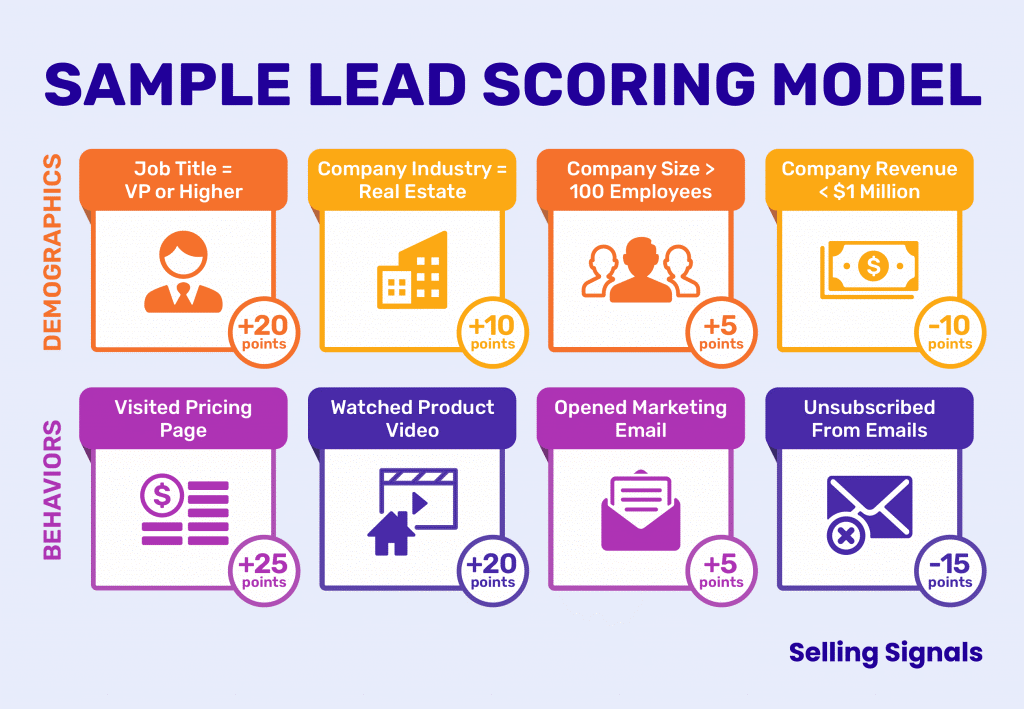There is a common misconception in marketing and public relations when it comes to lead generation. Many think that lead generation and lead nurturing take place only in the digital space, but there is a real-life component that must exist, or else lead volume or quality can fizzle: Lead scoring.
Lead scoring is a way to take important insights and data from both digital and human knowledge of the customer, meld them together and create a template for future actions. When the sales team connects with the customer another level of valuable data can be gathered and applied. Scores can help sales teams get a temperature check on clients before proceeding with any interactions.
Keep reading to learn more about the importance of lead scoring and how to identify and prioritize quality leads.
What is lead scoring?
Lead scoring is the process through which leads are ranked using data. Companies create models and assign value to different aspects of their leads, and then each lead’s quality is measured, and a total score is assigned. Lead qualification can be based on past lead and sales data to establish a base scoring process. Prioritizing form submissions will help brands collect leads for scoring, giving even more data. Other factors including online behavior such as website visits, social media engagement, email opens, click-throughs, purchases and others, as well as demographics and insights from the sales team can all contribute to the lead scoring model.
Here’s a sample model that shows how points can work:

The need for lead scoring
When it comes to lead scoring, filtering and qualifying leads is vital as many companies experience challenges with unqualified leads. Businesses and sales associates will not want to spend time nurturing a lead that will never close (complete a sale). That is a waste of resources and ultimately might take attention away from a quality lead. Lead scoring helps address these challenges, giving companies and sales teams an indication of where to focus effort and resources.
Qualifying leads through additional data
Lead information maximization is key to creating a highly sophisticated lead-scoring structure. Regarding lead scoring importance, brands should explore additional methods to qualify leads beyond traditional criteria by prioritizing form submission enhancements. One strategy is to add new fields to online forms for better lead qualification. This can help provide deeper insights into the lead’s product needs, budget, end goals and more. Messaging around forms can influence lead understanding, willingness to provide more information and qualification. So, with lead scoring importance in mind, it’s a good idea to ensure that the marketing team is involved for clear customer communication.
The role of sales teams
Marketing is there to support the sales team. However, the sales team can also provide valuable insights, contribute to scores and recognize lead scoring importance. If, for example, there is a high conversion rate for specific answers on the form fill, those questions can be weighted higher in the lead score. Even with prioritizing form submissions, the marketing team will not have this secondary level of information unless it is provided by sales associates. In the name of lead scoring importance, teams must work together to gain a holistic view of customer actions.
Algorithms and conversion value
Algorithms play a pivotal role in optimization of valuable leads, enabling businesses to sift through vast datasets and identify opportunities for cultivating customers and boosting sales. By prioritizing form submissions, brands can collect a larger data set, and therefore have a bigger pool of customers to create lead-scoring criteria. Lead scoring’s importance is also supported in recognizing the significance that data volume has on the algorithm and the ability to generate a conversion value.
Maximizing lead information
Brands seeking to maximize lead information will find success in prioritizing form submission. The comprehensive data gained about potential customers can provide a nuanced understanding of target audience preferences and behaviors. One effective strategy involves assigning monetary value to leads, thereby elevating their perceived significance. This not only incentivizes sales associates to focus on high-value leads but also provides a clearer roadmap for businesses to allocate resources efficiently.
Scoring big
Appreciating lead scoring importance and investing effort into this strategy will help sales teams identify and prioritize quality leads. While digital marketing is important, particularly prioritizing form submissions, the human element will take your company’s lead scoring to the next level. The best, most accurate insights and scores will come from the marketing and sales teams working together.
The experts at Beyond Fifteen can help your brand establish a process for lead scoring within your company. Connect with us to learn more!
